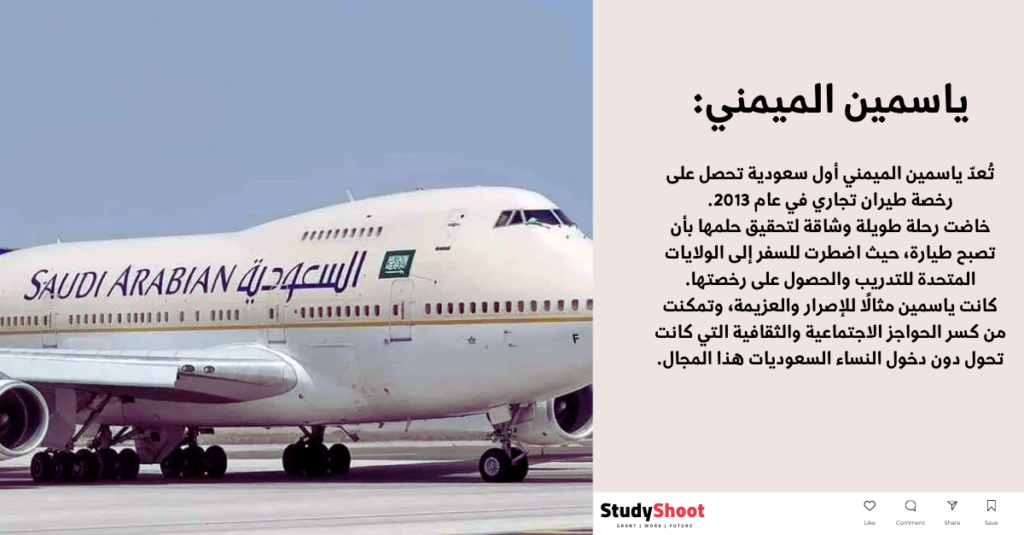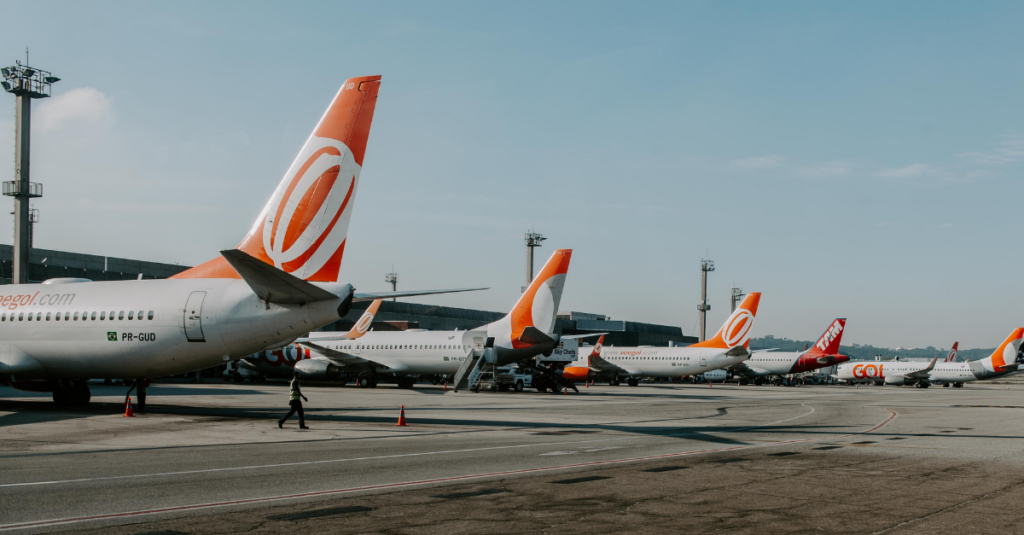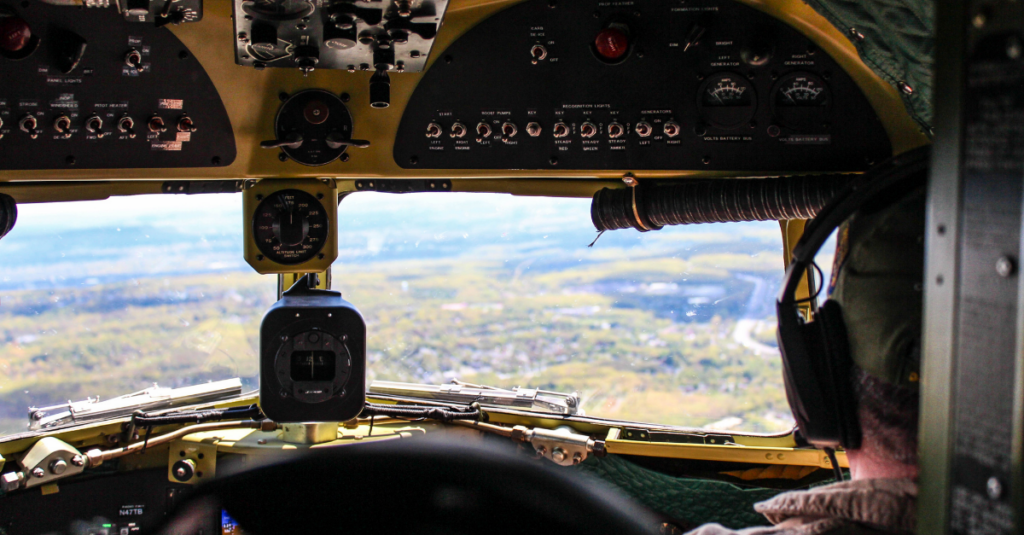شهدت المملكة العربية السعودية تطورًا كبيرًا في مجال تمكين المرأة، مما أدى إلى تحقيق إنجازات ملموسة في مختلف المجالات، ومن أبرزها مجال الطيران.
يُعتبر كابتن طيران بنات في السعودية خطوة جريئة ورائدة تعكس التزام المملكة بتعزيز المساواة بين الجنسين وتشجيع المرأة على المشاركة الفعالة في كافة القطاعات.
التاريخ والمرأة في الطيران السعودي
تعود بداية دخول المرأة السعودية مجال الطيران إلى تاريخ حديث نسبيًا، ولكنه شهد تطورات سريعة ومؤثرة. قبل بضعة عقود، كان من الصعب تصور وجود نساء سعوديات تعملن كطيارات، إذ كانت التقاليد الاجتماعية والمفاهيم الثقافية تحد من انخراط المرأة في مجالات عدة، خاصة تلك التي تتطلب سفرًا وتحديات تقنية مثل الطيران.
ومع ذلك، بدأت الأمور تتغير بشكل ملحوظ مع تزايد الوعي بأهمية تمكين المرأة وتعزيز دورها في التنمية الشاملة. جاءت هذه التغييرات في سياق رؤية المملكة 2030، التي وضعت تمكين المرأة كأحد أهم أهدافها، وشملت إصلاحات تشريعية تهدف إلى إزالة العوائق أمام المرأة السعودية في مختلف المجالات.
في هذا السياق، شهدت السنوات الأخيرة مبادرات حكومية عديدة لدعم تعليم وتدريب النساء في مجالات متنوعة، بما في ذلك الطيران.
بدأت العديد من المؤسسات الأكاديمية والتدريبية في قبول النساء في برامجها، مما أتاح لهن الفرصة لاكتساب المهارات اللازمة والعمل كطيارات محترفات.
أصبحت هذه الخطوات الإيجابية منطلقًا لعديد من النساء السعوديات لتحقيق أحلامهن والتحليق في سماء الطيران، مسجلات بذلك فصولًا جديدة في تاريخ المرأة السعودية.
التطور التاريخي لدور المرأة في الطيران
بدأت النساء السعوديات في الالتحاق بدورات الطيران والتدريب في الخارج قبل أن يتاح لهن الفرصة للتدريب والعمل داخل المملكة. وقد شهد العقد الأخير تحديدًا قفزة نوعية في عدد النساء اللواتي حصلن على رخص الطيران وبدأن بالعمل كطيارات مدنيات وعسكريات.
دور الحكومة السعودية في تمكين المرأة
لعبت الحكومة السعودية دورًا حيويًا ومؤثرًا في دعم وتمكين المرأة على مدى العقود الماضية. بدأت هذه الجهود بشكل جدي في السبعينيات والثمانينيات من القرن العشرين، حينما بدأت الحكومة في تبني سياسات تهدف إلى تحسين وضع المرأة في المجتمع وتمكينها من الحصول على التعليم والمشاركة في سوق العمل.
في البداية، ركزت الحكومة على توفير فرص التعليم للفتيات، مما أدى إلى زيادة معدلات التحاق الفتيات بالمدارس والجامعات. كانت هذه الخطوة بمثابة حجر الأساس لبناء جيل جديد من النساء المتعلمات القادرات على المشاركة بفعالية في التنمية الاقتصادية والاجتماعية.
في التسعينيات، بدأت الحكومة السعودية في اتخاذ خطوات أكثر جرأة لتمكين المرأة، بما في ذلك فتح مجالات عمل جديدة كانت سابقًا مغلقة أمام النساء. تم إصدار تشريعات تهدف إلى تعزيز حقوق المرأة في مكان العمل، وتوفير بيئة عمل آمنة ومتساوية.
مع دخول الألفية الجديدة، تسارعت جهود تمكين المرأة مع تشكيل لجان واستراتيجيات وطنية تهدف إلى زيادة مشاركة المرأة في مختلف القطاعات. كانت هذه السياسات جزءًا من رؤية المملكة لتحديث المجتمع وتحقيق التنمية المستدامة.
وجاءت رؤية 2030 لتعزز هذه الجهود بشكل أكبر وأشمل، حيث وضعت تمكين المرأة كأحد أهم أهدافها. تضمنت الرؤية برامج ومبادرات محددة تهدف إلى رفع نسبة مشاركة المرأة في القوى العاملة، ودعمها للوصول إلى مناصب قيادية.
كما شهدت السنوات الأخيرة إصدار العديد من التشريعات التي تسهل أن تصبح النساء كابتن طيران بنات في السعودية للمشاركة الكاملة في الحياة الاقتصادية والاجتماعية، مما أزال العديد من الحواجز التقليدية التي كانت تحد من دورها في المجتمع.

النساء الرائدات في الطيران السعودي
توجد العديد من النساء السعوديات اللواتي برزن في مجال الطيران وحققن نجاحات ملهمة، حيث تركت هؤلاء الرائدات بصمة واضحة وأصبحن قدوة للجيل الجديد من النساء الطموحات. من بين هؤلاء النساء:
ياسمين الميمني:
تُعدّ ياسمين الميمني أول كابتن طيران بنات في السعودية تحصل على رخصة طيران تجاري في عام 2013. خاضت رحلة طويلة وشاقة لتحقيق حلمها بأن تصبح طيارة، حيث اضطرت للسفر إلى الولايات المتحدة للتدريب والحصول على رخصتها. كانت ياسمين مثالًا للإصرار والعزيمة، وتمكنت من كسر الحواجز الاجتماعية والثقافية التي كانت تحول دون دخول النساء السعوديات هذا المجال.
هنادي الهندي:
تُعدّ هنادي الهندي أول امرأة سعودية تقود طائرة بشكل رسمي داخل المملكة. حصلت على رخصة الطيران التجاري من الأردن، وبدأت عملها مع شركة المملكة القابضة في عام 2014. شكلت هنادي نموذجًا للمرأة السعودية القادرة على التفوق في المجالات التي كانت تقليديًا حكراً على الرجال.
ساهمت هؤلاء الرائدات في تغيير الصورة النمطية عن المرأة السعودية وأثبتن أنهن قادرات على تحقيق إنجازات عظيمة في مجالات كانت تعتبر بعيدة المنال. يعتبر نجاحهن دليلًا على التحولات الاجتماعية الكبيرة التي تشهدها المملكة، والتقدم المستمر نحو تمكين المرأة في جميع المجالات.
قصص النجاح للنساء السعوديات في مجال الطيران مليئة بالتحديات والمثابرة. تروي لنا كل قصة كيف تغلبت هؤلاء النساء على الصعوبات وتفوقن في مجال كان يُعتبر لفترة طويلة حكرًا على الرجال.
التحديات التي واجهتها النساء في الطيران
واجهت النساء السعوديات في مجال الطيران العديد من التحديات الاجتماعية والثقافية التي بدأت من المنزل وامتدت إلى المجتمع بأكمله.
داخل المنزل
في البداية، كان على النساء مواجهة التوقعات التقليدية التي تتوقع منهن البقاء في أدوار محددة داخل المنزل. كانت هناك مقاومة من بعض أفراد الأسرة تجاه فكرة أن تعمل المرأة كطيارة، وهو ما اعتبروه مهنة تتطلب السفر المستمر والغياب عن المنزل لفترات طويلة. هذه التوقعات الاجتماعية فرضت ضغوطًا إضافية على النساء الراغبات في دخول مجال الطيران.
في الشارع والمجتمع
عندما تغادر المرأة المنزل وتبدأ في متابعة طموحها في مجال الطيران، كانت تواجه نظرات الشك والانتقادات من المجتمع الأوسع. كانت الأعراف الاجتماعية تفضل الأدوار التقليدية للمرأة، مما جعل من الصعب على الكثيرات التجرؤ على كسر القوالب النمطية. التحديات في الشارع والمجتمع تشمل التمييز والتعليقات السلبية التي قد تؤثر على الثقة بالنفس والدعم المعنوي المطلوب للنجاح في مهنة تتطلب الكثير من الشجاعة والعزم.
الدعم المجتمعي
على الرغم من هذه التحديات، بدأت الأمور تتغير تدريجيًا مع تزايد الوعي والدعم المجتمعي. مع تقدم الزمن، أصبح هناك فهم أكبر لأهمية دور المرأة في جميع المجالات، بما في ذلك الطيران. الدعم المتزايد من المجتمع، بالإضافة إلى المبادرات التوعوية، ساعد الكثير من النساء على التغلب على الحواجز الاجتماعية والثقافية.
التحديات المهنية والتقنية
إلى جانب التحديات الاجتماعية، واجهت النساء في الطيران تحديات مهنية وتقنية كبيرة. مهنة الطيران تتطلب مستوى عالٍ من التدريب والتخصص، مما يتطلب الكثير من الوقت والجهد والتكاليف المالية.
كان من الصعب على النساء السعوديات الحصول على الفرص اللازمة للتدريب، سواء داخل المملكة أو خارجها.
كان هناك نقص في البنية التحتية الداعمة للنساء في الطيران. لم تكن هناك برامج كافية لتدريب كابتن طيران بنات في السعودية، ولم تكن المؤسسات الأكاديمية والتدريبية تستوعب العدد الكافي من النساء الراغبات في دخول هذا المجال.
بالإضافة إلى ذلك، كانت هناك حاجة إلى مدربين محترفين ومعدات تدريب حديثة لتلبية المعايير الدولية.
مبادرات لتصبحي كابتن طيران بنات في السعودية
مبادرات هيئة الطيران المدني
لعبت هيئة الطيران المدني دورًا بارزًا في دعم المرأة السعودية في هذا المجال من خلال إطلاق برامج ومبادرات تهدف إلى تدريب وتأهيل النساء للعمل كطيارات. كما تم تقديم الدعم اللازم لهن للانخراط في سوق العمل بشكل فعّال.
الدعم المقدم من الخطوط الجوية السعودية
قدمت الخطوط الجوية السعودية العديد من البرامج التدريبية للنساء، بالإضافة إلى توفير بيئة عمل داعمة تمكنهن من ممارسة مهنتهن بكفاءة واحترافية. كانت هذه الجهود جزءًا من التزام الشركة بدعم رؤية المملكة 2030.

سجل في خدماتنا الآن
نقدم لك خدمات تجهيز الوثائق وترجمتها. استفد من خدمة الاستشارات لدينا واحصل على خصومات.
تعرف على المزيد..كابتن طيران بنات في السعودية: علمي أم أدبي في السعودية؟
في المملكة العربية السعودية، يعتبر تخصص الطيران من التخصصات العلمية. يتطلب هذا المجال خلفية قوية في العلوم والرياضيات، وذلك بسبب الطابع التقني والمعقد للدراسة والتدريب في مجال الطيران. هناك عدد من الأسباب التي تجعل الطيران تخصصًا علميًا:
1. المتطلبات الأكاديمية
- الرياضيات: يتطلب الطيران فهمًا جيدًا للرياضيات، بما في ذلك الحساب والجبر والهندسة.
- الفيزياء: تعتبر الفيزياء من المواد الأساسية لفهم الديناميكا الهوائية ومبادئ الطيران.
- الكيمياء: قد تكون ضرورية في بعض الأحيان لفهم الوقود ومواد التشحيم والمواد المركبة المستخدمة في الطائرات.
2. التدريب العملي
- التقنيات الحديثة: يستخدم الطيارون تقنيات حديثة مثل أنظمة الملاحة الجوية وأجهزة الكمبيوتر المتقدمة.
- التدريب على المحاكيات: يشمل التدريب العملي استخدام محاكيات الطيران التي تتطلب فهمًا تقنيًا عاليًا.
3. المهارات العلمية المطلوبة
- تحليل البيانات: يحتاج الطيارون إلى القدرة على تحليل البيانات الجوية والملاحة.
- حل المشكلات: يتطلب الطيران مهارات حل المشكلات التقنية والعلمية في الحالات الطارئة.
المؤهلات المطلوبة لدراسة الطيران
التعليم الثانوي
- المسار العلمي: يتعين على الطلاب الراغبين في دخول مجال الطيران اختيار المسار العلمي في التعليم الثانوي. يشمل ذلك دراسة مواد مثل الرياضيات المتقدمة والفيزياء والكيمياء.
- اللغة الإنجليزية: نظرًا لأن معظم البرامج الدراسية والكتب المرجعية في الطيران تكون باللغة الإنجليزية، فإن إتقان اللغة الإنجليزية يعتبر ضروريًا.
التعليم الجامعي والتدريب المتخصص
- كابتن طيران بنات في السعودية في علوم الطيران: بعد الانتهاء من التعليم الثانوي، يمكن للطلاب الالتحاق ببرامج البكالوريوس في علوم الطيران أو تخصصات ذات صلة في الجامعات والكليات المعترف بها.
- أكاديميات الطيران: توفر الأكاديميات المتخصصة تدريبًا مكثفًا للحصول على رخصة الطيران، وهو ما يتطلب اجتياز اختبارات نظرية وعملية صارمة.
الخطوات نحو لتصبحي كابتن طيران بنات في السعودية
- التحصيل العلمي في الثانوية العامة: إنهاء المسار العلمي بنجاح.
- الالتحاق ببرنامج دراسي في الطيران: سواء في جامعة أو أكاديمية طيران.
- اجتياز التدريب النظري والعملي: الحصول على ساعات الطيران اللازمة والتدريب على المحاكيات.
- الحصول على الرخصة: اجتياز الاختبارات اللازمة للحصول على رخصة الطيار.

أماكن الحصول على شهادة كابتن طيران بنات في السعودية
في المملكة العربية السعودية، هناك العديد من المؤسسات الأكاديمية والتدريبية التي توفر برامج كابتن طيران بنات في السعودية وشهادات في مجال الطيران للنساء. تشمل هذه المؤسسات:
1. أكاديمية أكسفورد للطيران
- الموقع: الرياض، الدمام.
- البرامج: توفر أكاديمية أكسفورد للطيران برامج تدريبية متنوعة تشمل التدريب على الطيران المدني وتقديم رخصة الطيار التجاري. تعتبر هذه الأكاديمية واحدة من أبرز المؤسسات التي تدعم النساء في دخول مجال الطيران.
2. أكاديمية الأمير سلطان لعلوم الطيران
- الموقع: جدة.
- البرامج: تقدم الأكاديمية برامج متخصصة في علوم الطيران، وتشمل تدريب الطيارين ومهندسي الطيران. الأكاديمية مجهزة بأحدث التقنيات والمعدات لتقديم تدريب متقدم وشامل.
3. جامعة الملك عبد العزيز
- الموقع: جدة.
- البرامج: توفر كلية علوم الطيران في جامعة الملك عبد العزيز برامج دراسية في مجال الطيران، بما في ذلك البكالوريوس في علوم الطيران وإدارة الطيران. تتيح الجامعة للنساء فرصًا متساوية للالتحاق بهذه البرامج.
4. الأكاديمية السعودية للطيران المدني
- الموقع: جدة.
- البرامج: تركز الأكاديمية على تدريب الطيارين والمراقبين الجويين. تقدم برامج تدريبية وشهادات معتمدة من هيئة الطيران المدني السعودي، وهي متاحة للنساء الراغبات في دخول هذا المجال.
5. كلية الطيران في جامعة الأمير سلطان
- الموقع: الرياض.
- البرامج: تقدم كلية الطيران في جامعة الأمير سلطان برامج دراسية في هندسة الطيران وإدارة الطيران، بالإضافة إلى برامج تدريب الطيارين. تعتبر الجامعة من المؤسسات الرائدة التي تدعم التعليم والتدريب في مجال الطيران للنساء.
6. برامج التدريب الدولي
- الموقع: خارج المملكة.
- البرامج: يمكن للنساء السعوديات أيضًا الحصول على تدريب وشهادات في مجال الطيران من مؤسسات دولية معترف بها، مثل أكاديميات الطيران في الولايات المتحدة وأوروبا. يتم الاعتراف بهذه الشهادات في السعودية وتعتبر مكملة للتدريب المحلي.
خطوات الحصول على شهادة طيران
- اختيار البرنامج المناسب: تحديد ما إذا كان الهدف هو الحصول على رخصة طيران تجاري أو دراسة جامعية في مجال علوم الطيران.
- التقديم: تقديم الطلبات للالتحاق بالبرامج الأكاديمية أو التدريبية في المؤسسات المختارة.
- التدريب النظري: يشمل دراسة المواد النظرية المتعلقة بالطيران، مثل القوانين الجوية والملاحة.
- التدريب العملي: يشمل ساعات الطيران العملية تحت إشراف مدربين معتمدين.
- الامتحانات: اجتياز الامتحانات النظرية والعملية للحصول على الشهادة أو الرخصة المطلوبة.
توفر الحكومة السعودية دعمًا كبيرًا للنساء الراغبات في دخول مجال الطيران من خلال برامج منح دراسية ومبادرات تدريبية متخصصة. يمكن الاستفادة من هذا الدعم للحصول على تعليم وتدريب عالي الجودة.
تتوفر العديد من الخيارات للنساء في السعودية للحصول على شهادة طيران، سواء من خلال المؤسسات المحلية المرموقة أو البرامج الدولية المعترف بها.
هذا التنوع في الفرص يعزز من تمكين المرأة ويتيح لها تحقيق أحلامها في مجال الطيران.
الفرق بين كابتن الطيران المدني والعسكري
تتطلب وظيفة كابتن الطيران المدني الحصول على رخصة طيران تجاري وإتمام ساعات معينة من الطيران. يتم تدريب الطيارات المدنيات على إدارة الرحلات الجوية التجارية وضمان سلامة الركاب.
أما كابتن الطيران العسكري، فيحتاج إلى تدريب أكثر صرامة وتخصصًا في التعامل مع الطائرات العسكرية والمهام القتالية. يتطلب ذلك مستوى عالٍ من اللياقة البدنية والعقلية لمواجهة الظروف الصعبة والمواقف الطارئة.
العمل اليومي لكابتن الطيران في السعودية
يتضمن يوم عمل كابتن الطيران السعودي العديد من المهام اليومية التي تبدأ بالتخطيط للرحلة والتأكد من جاهزية الطائرة، مرورًا بمتابعة حالة الطقس والتواصل مع فريق العمل، وانتهاءً بتنفيذ الرحلة بسلام.
تشمل التحديات التي تواجه كابتن الطيران في السعودية التعامل مع الظروف الجوية المتغيرة وضمان سلامة الركاب والطائرة. ومع ذلك، فإن العمل يوفر فرصًا كبيرة للتطوير المهني واكتساب خبرات جديدة.
يمثل التوازن بين الحياة الشخصية والمهنية تحديًا كبيرًا، إلا أن العديد من كابتن الطيران استطعن تحقيق هذا التوازن من خلال إدارة الوقت بشكل فعال والاعتماد على الدعم العائلي.
كيف تتعامل كابتن الطيران مع الحياة الشخصية والمهنية
تعتمد كابتن الطيران على التخطيط الجيد والتواصل المستمر مع العائلة للحفاظ على هذا التوازن. تقديم الدعم النفسي والمادي من الأهل والأصدقاء يلعب دورًا كبيرًا في النجاح في هذا الجانب.
الرؤية المستقبلية للمرأة في الطيران السعودي
الخطط المستقبلية والتوقعات
تشير التوقعات المستقبلية إلى زيادة عدد النساء اللواتي سيعملن في مجال الطيران في المملكة، وذلك بفضل المبادرات الحكومية والدعم المستمر من الشركات الخاصة. تهدف الخطط المستقبلية إلى تحقيق توازن أكبر بين الجنسين في هذا القطاع الحيوي.
دور المجتمع في دعم المرأة في الطيران
يلعب المجتمع دورًا حاسمًا في دعم المرأة في مجال الطيران من خلال تغيير النظرة التقليدية وتشجيع الفتيات على متابعة أحلامهن في هذا المجال. يعتبر الدعم الاجتماعي من أهم العوامل التي تساعد في نجاح المرأة وتحقيق طموحاتها.

فرص العمل لخريجات كابتن طيران بنات في السعودية
تتوفر العديد من الفرص الوظيفية لخريجات كابتن طيران في السعودية، حيث يمكنهن الالتحاق بمؤسسات وشركات متعددة داخل قطاع الطيران. تعكس هذه الفرص التقدم الكبير الذي حققته المملكة في تمكين المرأة ودعمها في مختلف المجالات، بما في ذلك الطيران. فيما يلي بعض من أبرز الفرص الوظيفية المتاحة:
1. الخطوط الجوية السعودية
- الدور: كابتن طيران بنات في السعودية
- الوصف: تعمل الطيارات في قيادة الطائرات التجارية التابعة للخطوط الجوية السعودية، وتنفيذ الرحلات الجوية الوطنية والدولية.
2. شركة طيران ناس
- الدور: كابتن طيران بنات في السعودية
- الوصف: تقدم طيران ناس فرصًا مميزة للطيارات السعوديات للعمل على خطوطها الداخلية والدولية. يمكنهن التقدم لشغل وظائف كابتن طيران أو مساعد طيار.
3. طيران أديل
- الدور: كابتن طيران بنات في السعودية
- الوصف: تبحث شركة طيران أديل دائمًا عن الطيارين الموهوبين، وتوفر فرصًا للنساء السعوديات للعمل في رحلاتها منخفضة التكلفة داخل وخارج المملكة.
4. الطيران العسكري
- الدور: كابتن طيران بنات في السعودية عسكري
- الوصف: تتيح القوات الجوية الملكية السعودية فرصًا للنساء للعمل كطيارات عسكريات بعد اجتياز التدريب العسكري اللازم. تشمل المهام الطيران القتالي والاستطلاع.
5. هيئة الطيران المدني
- الدور: مهندسة طيران بنات في السعودية
- الوصف: يمكن للنساء الحاصلات على شهادة الطيران العمل في هيئة الطيران المدني كمراجعات سلامة الطيران، حيث يقمن بتفتيش الطائرات وضمان الالتزام بمعايير السلامة.
6. الأكاديميات ومدارس الطيران
- الدور: مدربة طيران.
- الوصف: بعد اكتساب الخبرة الكافية، يمكن للطيارات السعوديات العمل كمدربات طيران في الأكاديميات المحلية والدولية، مثل أكاديمية أكسفورد للطيران وأكاديمية الأمير سلطان.
7. شركات الطيران الخاصة
- الدور: طيار طائرات خاصة.
- الوصف: توفر الشركات الخاصة والشركات الكبرى التي تملك طائرات خاصة فرصًا للعمل كطيارات لتنفيذ رحلات الطيران الخاصة برجال الأعمال وكبار الشخصيات.
8. الطيران الزراعي
- الدور: طيار رش زراعي.
- الوصف: يشمل هذا الدور قيادة الطائرات المستخدمة في رش المحاصيل الزراعية بالمبيدات والأسمدة، وهو مجال مفتوح للنساء اللواتي يرغبن في العمل في الطيران الزراعي.
9. الطيران الطبي
- الدور: طيار إخلاء طبي.
- الوصف: تشمل هذه الوظيفة قيادة الطائرات المجهزة لنقل المرضى والمصابين في حالات الطوارئ، وتعتبر من المجالات الحيوية التي تحتاج إلى طيارين مؤهلين.
10. الطيران السياحي
- الدور: طيار جولات سياحية.
- الوصف: يمكن للطيارات العمل في شركات الطيران السياحي التي تقدم جولات جوية للمواقع السياحية والمعالم الهامة داخل المملكة.
التطوير المهني والدورات المستمرة
لضمان التقدم المهني، يجب على الطيارات الخريجات الاستمرار في تطوير مهاراتهن من خلال الدورات التدريبية المستمرة والحصول على التراخيص والشهادات الإضافية. يشمل ذلك:
- دورات المحاكاة: لتحسين المهارات في بيئات محاكية للواقع.
- التدريب على الطائرات الجديدة: لتوسيع نطاق الطائرات التي يمكنهن قيادتها.
- التدريب على حالات الطوارئ: لتعزيز الجاهزية للتعامل مع المواقف غير المتوقعة.
وختاماً لقولنا هذا
كابتن طيران بنات في السعودية مثالًا حيًا على النجاح والتحدي. إن دعم وتمكين المرأة في جميع المجالات، بما في ذلك الطيران، ليس مجرد خطوة نحو المساواة، بل هو ضرورة لتحقيق التنمية الشاملة والمستدامة في المملكة. مستقبل النساء في الطيران السعودي يبدو واعدًا، وينبغي علينا جميعًا دعم هذه الجهود والمساهمة في تحقيق رؤية متقدمة وشاملة.

